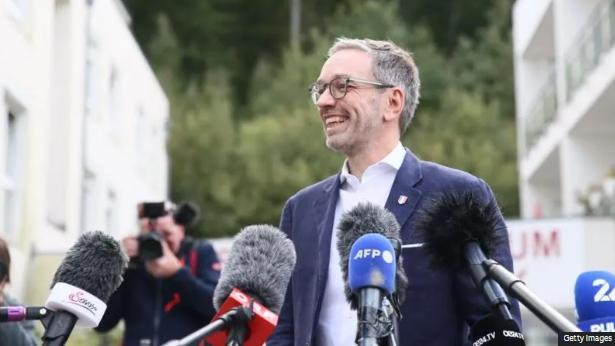Austria’s far-right Freedom Party (FPÖ), led by Herbert Kickl, is projected to achieve an unprecedented victory in the general election, according to early results. The projections indicate that Kickl’s party is receiving around 29.2% of the vote, placing it nearly three points ahead of the conservative People’s Party, which stands at 26.3%. However, neither party appears to be close to securing a majority.
While the Freedom Party has participated in coalitions in the past, the conservative People’s Party has ruled out any government led by Kickl. Incumbent Chancellor Karl Nehammer of the People’s Party has stated that it is “impossible to form a government with someone who adores conspiracy theories.”
Approximately 6.3 million Austrians were eligible to vote in this election, which has been heavily influenced by issues surrounding migration, asylum, inflation, and the war in Ukraine. Michael Schnedlitz, the general secretary of the Freedom Party, expressed his delight at the initial projections, stating that “the men and women of Austria have made history today,” but refrained from discussing potential coalition plans.
The Freedom Party is on track to secure around 57 seats in the 183-seat parliament, with the conservatives expected to hold 51 seats and the Social Democrats around 40. Kickl has made promises to establish a “Fortress Austria” aimed at restoring security, prosperity, and peace. He has also suggested he could become the Volkskanzler (people’s chancellor), a term that evokes memories of Adolf Hitler for some Austrians.
Forming a coalition will likely be a complex challenge for Herbert Kickl, given his polarizing nature. The Social Democrats, Greens, and Neos have all dismissed the idea of partnering with the far-right party. Consequently, the only viable coalition for Kickl’s party would be with the conservatives, although they would need to address the People’s Party’s unwillingness to accept Kickl as chancellor.
When Geert Wilders’ Freedom Party won the Netherlands’ election last November, he withdrew his bid for prime minister to facilitate coalition talks with three other parties. In contrast, Herbert Kickl is determined to become chancellor, pledging to serve as Austrians’ “servant and protector.”
Political analyst Thomas Hofer noted to the BBC that it is uncertain whether Austrian President Alexander Van der Bellen would grant Kickl a “direct mandate to form a coalition.” Van der Bellen has previously expressed concerns about the FPÖ due to its criticism of the EU and its reluctance to condemn Russia’s invasion of Ukraine, as the party opposes EU sanctions on Moscow, citing Austria’s tradition of neutrality.
Kickl’s projected electoral victory marks the latest success for radical right-wing parties across Europe. Italy’s Giorgia Meloni leads a right-wing coalition as head of the far-right Brothers of Italy party, while Germany’s AfD topped the polls in the eastern state of Thuringia last month. Unlike Kickl, Meloni has fully supported the EU’s defense of Ukraine amid Russia’s ongoing invasion.
Kickl has effectively tapped into public fears regarding immigration and has capitalized on frustrations over the government’s handling of the COVID-19 pandemic, even embracing conspiracy theories related to unconventional treatments for the virus.


